Hong Kong News

Covid-19 fuels forced marriage risk for girls in Hong Kong, Britain
Jani*, a 17-year-old Briton of Bangladeshi descent living in the United Kingdom, has spent the past year in constant dread.
“I fear that I will be taken abroad and never let back. [And that] I will be raped,” she said.
Jani’s family started telling her she needed to get married after she turned 16, as the Covid-19 pandemic began sweeping through the country in March last year. The pressure on her, along with verbal abuse, increased in the subsequent lockdowns.
“We all live in the same flat. It is very hard. No rest, no peace, just pressure,” she said. “My brother shouts ‘get married’, ‘get married’. ‘You are a shame on the family’.”
Jani’s family showed her a picture of a 38-year-old cousin they wanted her to marry.
“They want him to come here,” she said. “[They say] I am costing them money, like the food I eat.”
Jani is among hundreds of girls belonging to ethnic minorities living in places such as Britain and Hong Kong who are facing the prospect of forced marriages. Their plight has been made worse by a pandemic that has put greater financial stress on their families and removed them from networks of support such as in-person school or college classes.
Experts fear that a rising number of girls and young women will be sent to their families’ countries of origin after constraints on international travel are lifted. Some have already been trapped abroad due to Covid-19 restrictions, and are desperately trying to escape forced marriages and make their way back to Britain and Hong Kong.
“Children and young women are at greater risk of forced marriage and dishonour abuse. Parents are taking some of them out of education completely and no one is checking on them. It’s very worrying,” said Aneeta Prem, founder of UK-based Freedom Charity, which supports victims of forced marriage, family dishonour, and female genital mutilation.
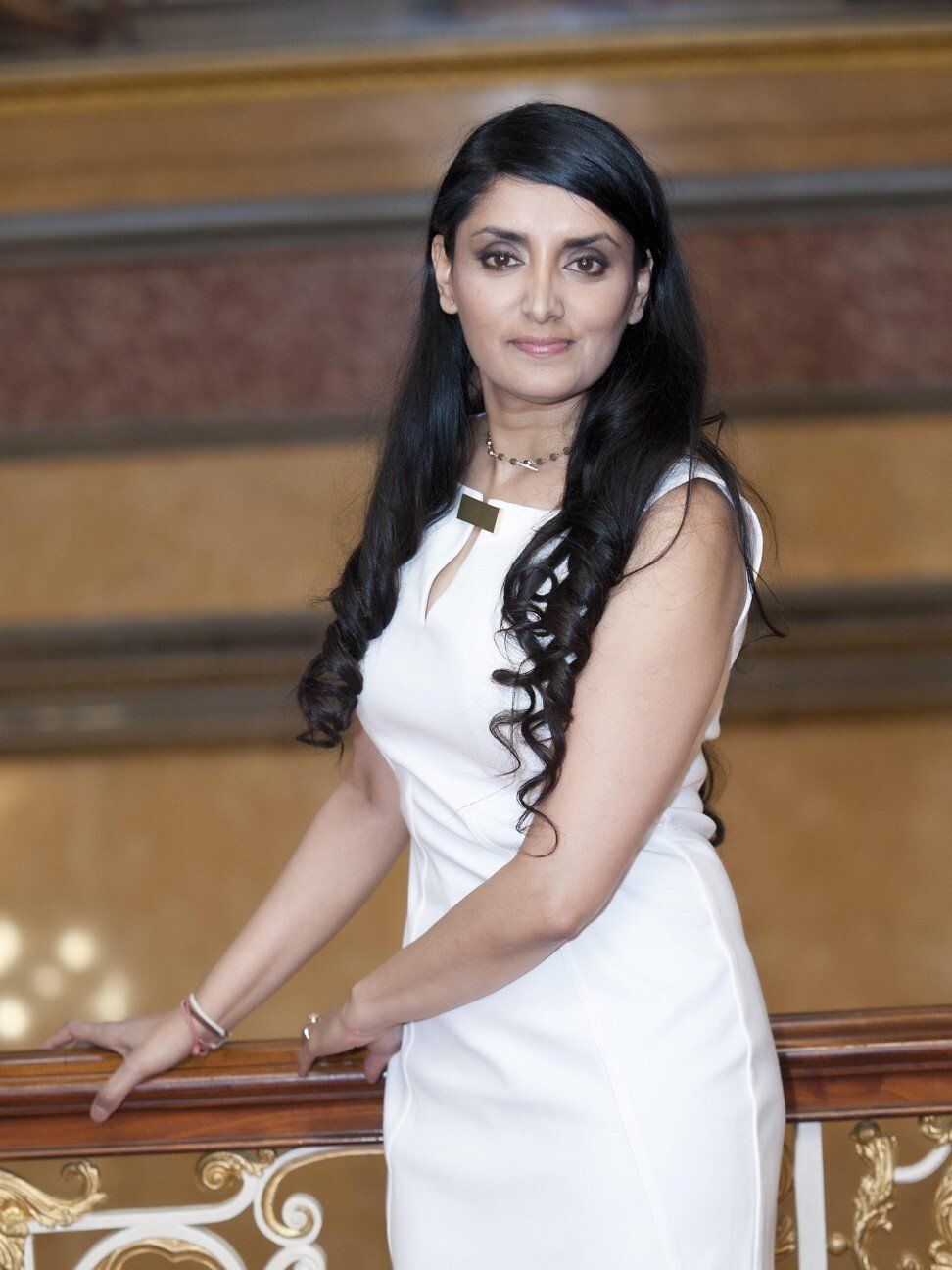 Aneeta Prem.
Aneeta Prem.
A forced marriage takes place when one or both people do not – or cannot, in cases involving learning disabilities – consent to the marriage, and pressure or abuse is used. This is different from an arranged marriage, where the match happens through an intermediary, but both individuals consent.
According to the United Nations, child marriage refers to any union in which at least one person is under 18 – and it is considered a form of forced marriage.
Advocates fear that the coronavirus pandemic could reverse years of progress on ending the practice, as the UN expects 13 million extra child marriages to take place in the next decade.
A report published last year by the charity Save the Children said that girls in South Asia were disproportionately impacted by the risk of child marriage, followed by those in West and Central Africa, Latin America and the Caribbean. The practice was expected to become more common in East Asia and the Pacific, Europe, Central Asia, the Middle East and North Africa.
PLANNING AN ESCAPE
Amina*, who was born and raised in Britain, soon came to understand that being a girl came with a heavy burden.
She got used to doing most of the house chores, including cooking, cleaning, and shopping. Yet, as much as she did, Amina always felt it wasn’t enough.
The 23-year-old of South Asian descent was not able to attend university because her family wanted her to get married instead, and she could not afford the fees by herself.
She found a part-time job, which provided her a respite from the pressure she felt from her family. But when the first lockdown began last year she was furloughed, which meant the abuse at home not only continued but got worse.
Amina said there wasn’t a day when she was not verbally abused, told she was “worth nothing” or that she was “ugly” and that no one would want her. She was often beaten for speaking out.
Amina was able recently to return to work, but the pressure at home has not waned.
“They interrogated me for hours because I had to work late and did not call them,” she said. “They even called my boss to check if I was telling the truth. It was so embarrassing, but what could I say? I want to keep my job, it is my only way out.”
Amina doesn’t want to speak to the police, because the last time she did, “it made things worse, and nothing changed”.
She now spends her days managing the risk of abuse and trying to save money, while planning her escape from her family home with the help of a non-profit organisation.
Every now and then the marriage conversation comes up, but she does her best to avoid it.
In a way, she said, “Covid-19 is a blessing, as I would have been taken overseas by now and you would never hear from me again.”
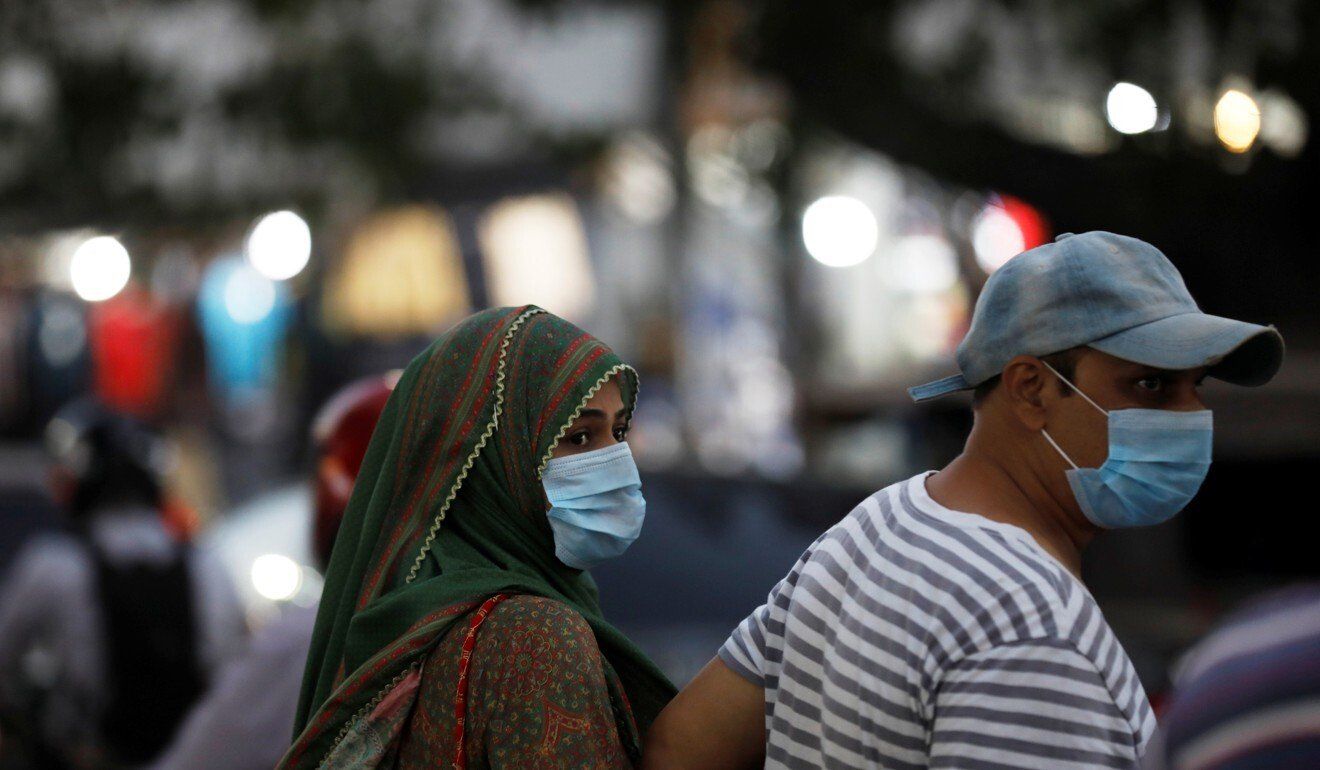 A couple wearing protective masks walk along a market in Karachi, Pakistan, amid the coronavirus pandemic.
A couple wearing protective masks walk along a market in Karachi, Pakistan, amid the coronavirus pandemic.
CALLS FOR HELP
Non-profit organisations in Britain have been swamped with requests for help.
Freedom Charity had seen a 40 per cent increase in cases from this time last year, Prem said.
In most cases, “they are terrified that their parents will force them into a marriage,” she said.
“It’s very difficult for these young women to say no to their families because they will be disowned,” Prem said, noting that pressure often came from their fathers and brothers.
She said that the majority of those seeking help from Freedom Charity, which runs an app that offers assistance to victims of forced marriage, were aged between 14 and 18 years old, and were British citizens with family ties in South Asian countries.
Prem is worried the age of those pushed into forced marriages will drop and that many have lost their opportunity for an education amid the coronavirus crisis.
Girls, perceived as a financial burden by some families, are being married off as a source of income, with some unions serving to retain family land and to maintain or forge connections.
The motivation from their families is “financial, but it is also about control”, Prem said.
Yasmin Khan, founder of The Halo Project Charity, a Britain-based non-profit group that supports victims of honour-based violence, forced marriages and female genital mutilation, said “honour-based abuse” had “certainly escalated during the pandemic”.
While cases had grown in complexity and victims faced greater risks, she said support services were more limited and mostly operated online during periods of lockdown. Language barriers and immigration status had posed further challenges, Khan said.
Polly Harrar, founder of the Sharan Project – a charity supporting South Asian women in Britain who have been affected by abuse or persecution – said in the last 10 months of 2020 it had helped with the safe removal of five minors, aged 16 and under, due to forced marriage.
“What we have seen is an increase in high risk and high harm cases” from physical assault to attempted murder, Harrar said. Most involved young people affected by honour-based abuse and fears of forced marriage.
The majority of those who have sought help from the Sharan Project are of South Asian descent, aged between 18 and 24. “But we are seeing cases from women from all backgrounds, including Thailand, the Philippines, Yemen, Afghanistan and Somalia,” Harrar said.
According to the 2011 Census in England and Wales, Asians were the second largest ethnic group, accounting for 7.5 per cent of the population, or 4,213,531 people.
In 2019, the British government’s Forced Marriage Unit gave advice or support in 1,355 cases related to possible forced marriages.
Almost 30 per cent involved victims below 18 years old, while 36 per cent were aged between 18 and 25. Most victims were girls or women, but 262 cases involved male victims.
The majority of cases were linked to Pakistan, Bangladesh and India.
Last year’s statistics are not available. But a British government spokeswoman said that throughout the pandemic it had “remained committed to providing support and advice to victims”, noting that an additional £80,000 (US$110,000) had been granted to the national “honour-based abuse” helpline.
Forced marriage became a criminal offence in Britain in 2014, and the government has issued more than 2,600 Forced Marriage Protection Orders since they were introduced in 2008.
But experts say official figures do not reflect the full scale of the problem, as many more cases are likely to go unreported. Previous research estimated that forced marriages affected between 5,000 and 8,000 people in England each year.
STRANDED ABROAD
Harrar said that while flight restrictions meant fewer women were being taken abroad to be married against their will, lockdown had allowed more time to plan weddings.
“There are real concerns that once restrictions are lifted, there will be an increase in travel for the purpose of forced marriage and female genital mutilation,” she said.
Two advocates said they had heard that marriage ceremonies had taken place via WhatsApp and video calls.
At the same time, some girls were stuck overseas, Harrar said. “What we are seeing more of is cases of British nationals trapped abroad before the restrictions were put in place and struggling to escape back to the UK.”
She said some South Asian countries were not in the British government’s declared “red zone”, “so travel for some is still available”.
In these cases, Harrar said, “they have to work even harder given the in-country restrictions and secretly take a Covid-19 test before travelling, which is made all the more challenging when they are constantly under surveillance”.
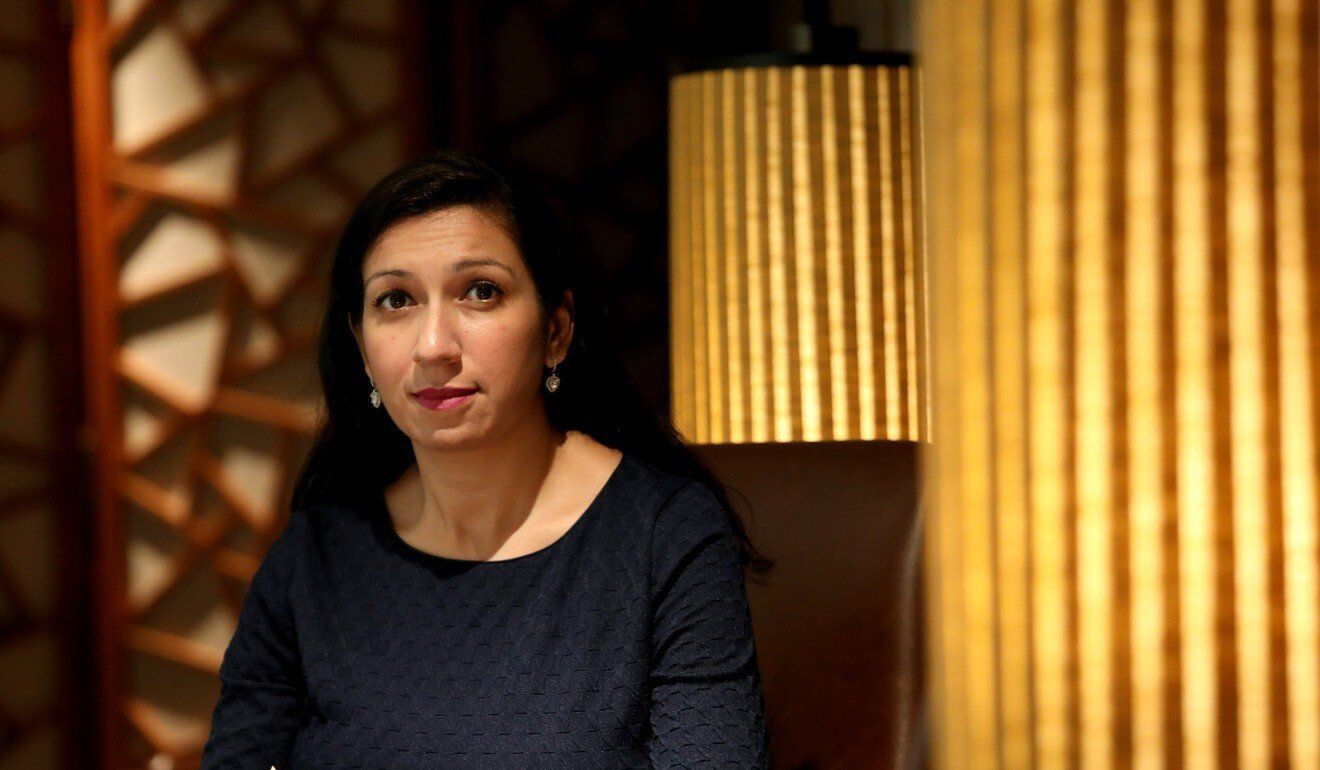 Puja Kapai, an associate professor of law at the University of Hong Kong.
Puja Kapai, an associate professor of law at the University of Hong Kong.
A similar concern is shared by Puja Kapai, an associate professor of law at the University of Hong Kong. The former British colony is home to more than 584,000 people belonging to ethnic minority groups, accounting for eight per cent of the city’s population, according to official statistics.
The scholar said that whereas before the pandemic, the girls would typically end up being engaged during their extended school holidays over Christmas or the summer break, because of the economic effects of the pandemic many families had left Hong Kong early last year to save on costs.
“This has significantly advanced the risks of such early engagements and/or marriages for certain groups of girls,” she said.
While some forced marriages may have been put on hold due to the suspension of international travel since March 2020, “it may have left stranded some of the girls whose marriages were brought forward due to the travel restrictions and the suspension of in-person classes,” Kapai said.
BEARING THE BRUNT
Shalini Mahtani, founder and CEO of The Zubin Foundation, which works with underprivileged ethnic minority groups in Hong Kong, said the pandemic had had a major economic impact on the city’s ethnic minority groups.
“There is real desperation in the community … People were losing jobs or not able to get them back. That has resulted in the second issue, which is poverty and hunger,” she said. “The third issue is the social impact of all of that. In any society, women often bear the brunt of many of the economic issues.”
She said problems had increased over the past year, as unemployed husbands stayed in tiny, subdivided flats with their wives – many of whom did not have a job before the pandemic – and four or five children.
“We have families saying to their daughters that they should go and get married,” Mahtani said. “Many South Asian girls are on borrowed time. They have negotiated with their families: ‘let me study, I will get married after three years.”
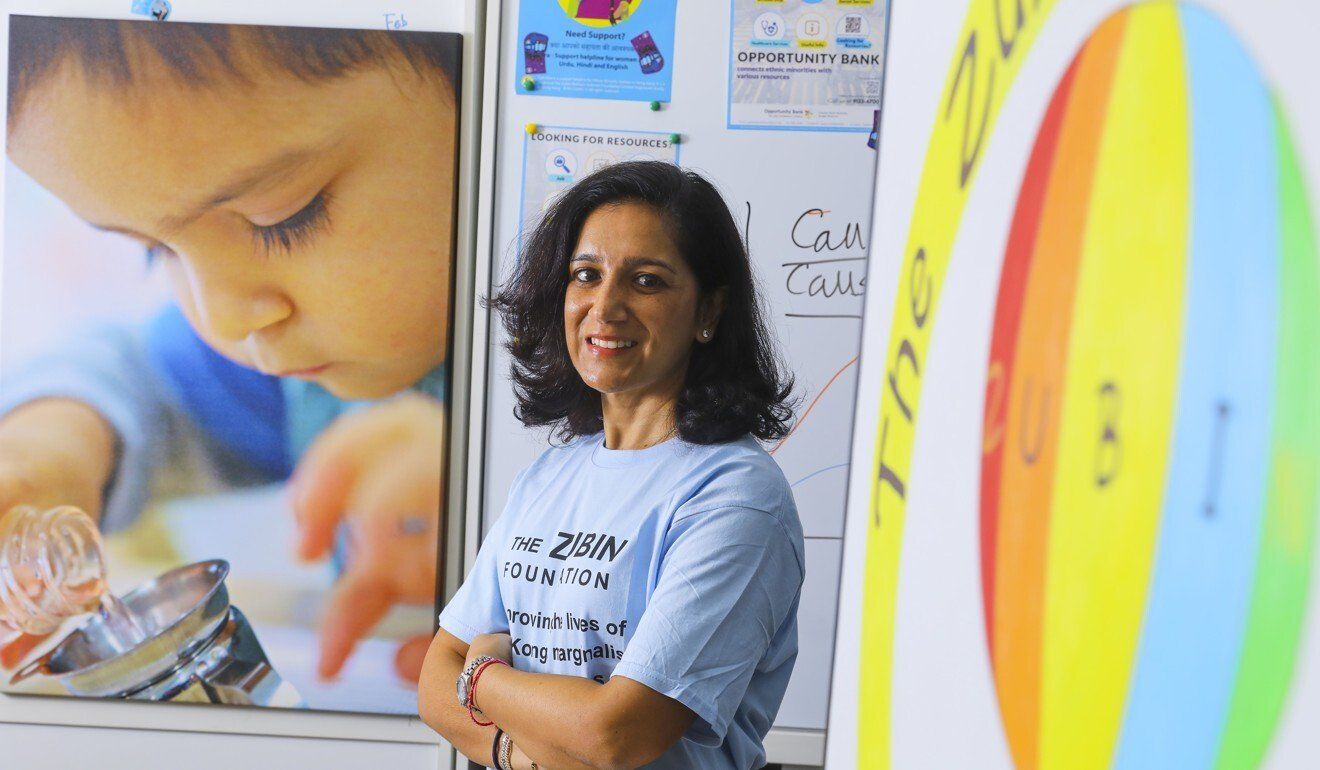 Shalini Mahtani, founder and CEO of The Zubin Foundation.
Shalini Mahtani, founder and CEO of The Zubin Foundation.
But as the pressure had mounted at home and in-person classes had been suspended for most of the year, the advocate said they now had less bargaining power.
“Forced marriages are more common than we think,” Mahtani noted.
She said the non-profit group had seen more girls and women who needed to leave their homes due to physical and psychological abuse.
Domestic violence has increased not only among ethnic minority groups, but across the board in various countries during the pandemic.
A spokeswoman for Harmony House, Hong Kong’s first shelter for abused women, said it had admitted 272 families over the past year. Of those, 37 had ethnic minority backgrounds, including from Pakistan, India and Nepal.
Sandy Chan, operations director of The Zubin Foundation, said their helpline received 1,438 calls in total last year, with the number more than tripling during the pandemic, compared to 375 calls in 2019. Requests for counselling services and legal support were among the most common.
She said the NGO had encountered about four cases of forced marriage – one of those through their helpline. Other callers “mentioned and complained about forced marriage, but there were usually other pressing issues that needed our action”, said Chan, noting that such cases would not count as forced marriages in the NGO’s records.
Chan said The Zubin Foundation had helped to prevent a girl from being sent overseas last year.
The teenager, who had been engaged to a senior relative, had faced increased pressure from her parents, who wanted to send her to their home country for marriage.
“One day, she was asked to go to the bank to close her bank account and handed over her laptop before going to school,” Chan said.
The girl eventually alerted her school, which in turn called Zubin’s helpline. “She was able to finish that academic year and graduated,” the support worker said.
OBLIGATION AND DESPAIR
Mahtani echoed other support workers’ concerns over girls being sent to their families’ home countries to get married against their will. “I really hope when Hong Kong opens up these girls are not taken back to those places,” she said.
Mahtani said forced marriages usually involved someone who was part of the families’ clan in their ancestral village. Often, the girls hadn’t met the man.
She said it was difficult to know what the financial arrangements were, but some girls went to countries such as Pakistan and then returned to live in Hong Kong with their husbands.
“It’s very precious to marry a Hong Kong-Pakistani girl,” Mahtani noted, as most hold permanent identity cards, which grant the right to live and work in Hong Kong.
For the girls, it’s often an internal struggle between their families’ expectations and their own personal aspirations.
“Hong Kong is their identity. They feel very ‘Hongkonger’, but they are being asked to be someone else,” Mahtani said. “It is very hard for them.”
Law professor Kapai led research based on interviews with 25 Pakistanis in Hong Kong aged 14 to 22. Several participants reported that it was common for Pakistani children to be engaged or encouraged to get married early in life – identifying 14 to 15 as the typical ages for girls.
“I know of girls in Hong Kong between the ages of 14 to 16 who are married to men 10 years older than them and pregnant,” a participant said.
The study, conducted between 2017 and 2018, found the children were expected to safeguard the family’s reputation and avoid disputes.

One of the female interviewees said: “If I tell someone I’m being forced into marriage, it would be really embarrassing for me, so I would tell others that I chose him … No one will come out willingly and say they were forced. No parent would say they forced their daughter to marry.”
Another girl quoted in the research also said she would avoid sharing this issue. “I don‘t want them to think my parents are like this. I don’t want people to think I’m suffering a lot,” she said.
Kapai highlighted the disruptions to regular school attendance and activities as a major issue that emerged with the pandemic. This “may have accelerated the timetable for early engagement and marriage of girls,” she said, noting that girls were more likely to be expected to do housework when home.
“In the past, sudden dropouts among particular girls would raise some alarm, albeit often belatedly, wherein there would be little that could be done once the girl concerned was already out of Hong Kong,” Kapai said. But the coronavirus crisis had “left teachers without much to pick up on, given the unusually high dropout rates among children across various communities”.
Kapai’s report said schools should develop a clear policy to track the progress of all children to better understand factors that might signal an indirect call for support, such as a sudden drop-out. It also said that the government should track all children leaving and entering Hong Kong, and long absences should be investigated.
A spokesman for the Security Bureau said that “frontline officers at control points will always stay alert in any case where there is an indication that a child is travelling with an unfamiliar adult or is otherwise being taken outside Hong Kong unlawfully”.
He said that victims and potential ones were encouraged “to report and seek assistance from the authorities as soon as practicable”.
LACK OF AWARENESS
Kapai said a number of “subtleties” made it difficult to pinpoint the prevalence of forced marriage in Hong Kong.
The line between a “sense of obligation and duress is unclear for many, given that some girls are pressured in the name of family honour, or to secure a better future for their siblings,” she said.
Kapai’s study found that each family and their underlying context, structure and value system appeared to be unique.
Ansah Malik, a social worker of Pakistani descent in Hong Kong, also said it was important not to paint all families belonging to ethnic minorities with the same brush, adding that she believed that forced marriages were not widespread within ethnic minority communities in Hong Kong.
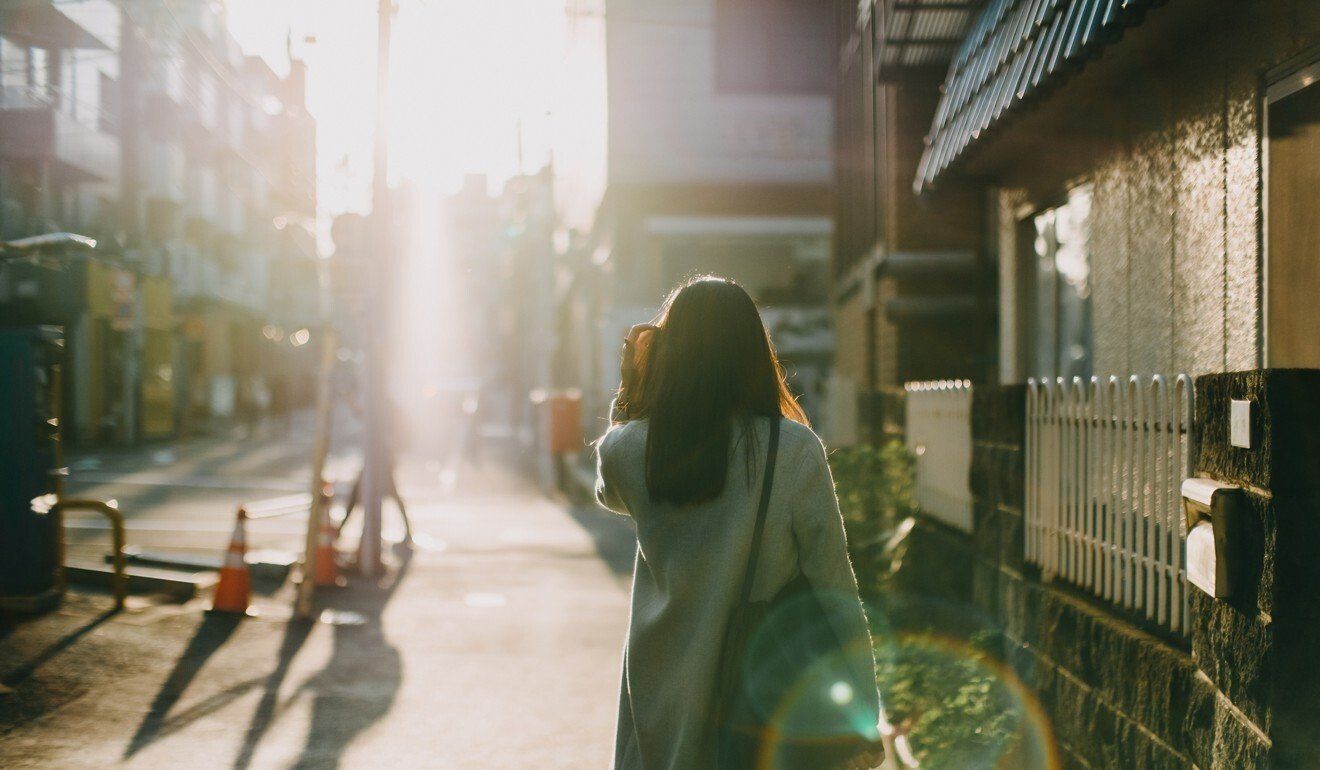
However, Malik said she had encountered more cases of “depression and mood swings” among women, mostly due to added economic challenges and more stress at home during the pandemic.
Evelyn Tsao, partner of the Hong Kong-based law firm Patricia Ho & Associates, said that in the past year the firm had handled a case of a young woman who was forced to marry against her will.
“For reasons of confidentiality, I cannot disclose details of the case because to do so would put her security in jeopardy. This already tells you how threatening the circumstances are for a young woman in that situation,” the lawyer said.
Tsao said that Hong Kong, where the minimum age for marriage is 16, did not have legislation targeting the problem of women being trafficked for forced marriage.
However, Tsao said there were laws surrounding marriage, nullity and divorce. Victims of abuse, she said, could also seek protection under the domestic and cohabitation relationships violence ordinance.
Law professor Kapai said it was unclear how relevant provisions would apply when a marriage took place overseas, which was often the case.
In terms of what Hong Kong could do, she said that criminal law models such as those that had been adopted in Britain and across Europe offered little help. Instead, the professor argued, they “burden ethnic minority women by making it harder for them to come forward as victims.”
Kapai said Britain’s model had been criticised for leaving girls who turned to the Forced Marriage Unit in a bind, due to the impact of the criminal laws on their relationships with their family and community, with many facing grave physical danger as well as heavy emotional tolls.
“What victims need most is a system that can navigate the delicate nuances between family and community so as to provide victims with full and direct support to guarantee their safety,” the scholar said. This should happen, Kapai added, “without stigmatising and targeting the entire community through a top-down policy or legal framework driven entirely by punitive objectives”.
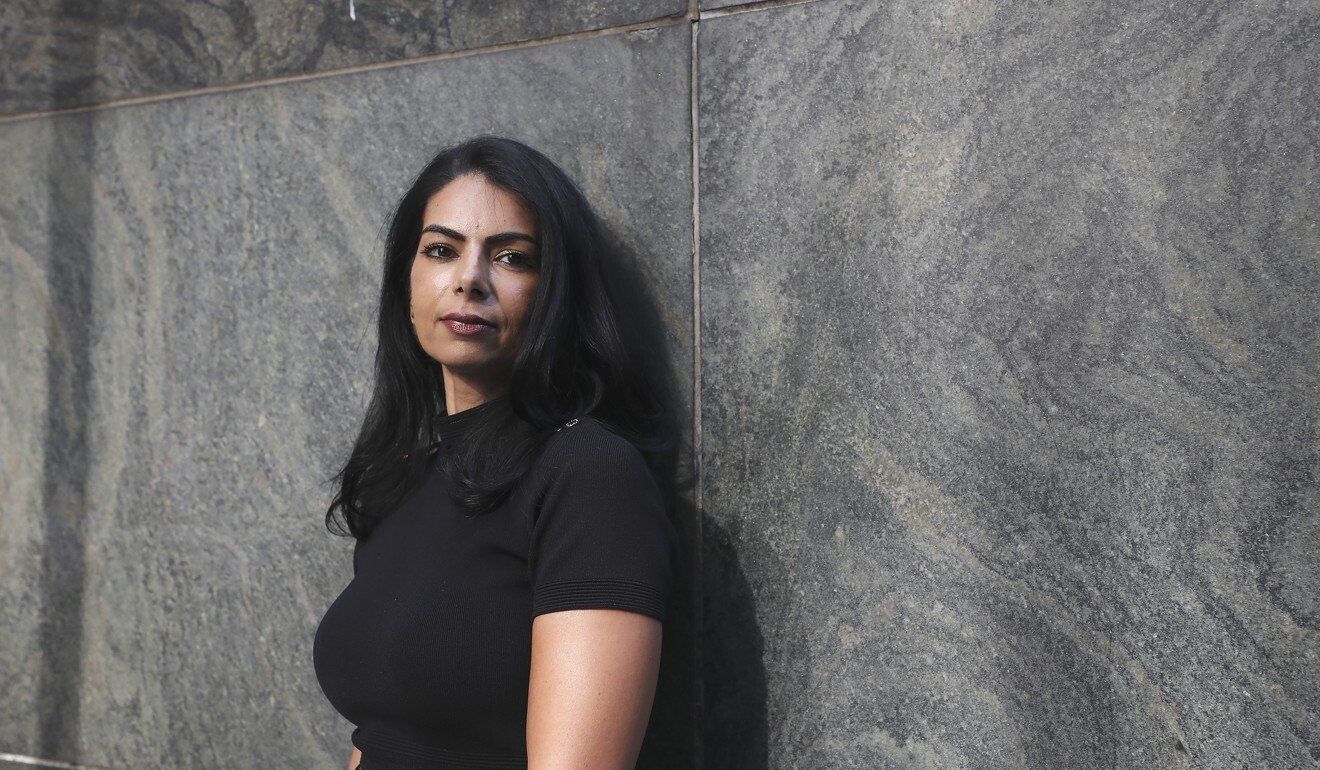 Counter-trafficking expert Archana Kotecha.
Counter-trafficking expert Archana Kotecha.
Counter-human trafficking expert Archana Kotecha, who is based in Hong Kong and previously worked in England, said the causes and the modus operandi were the same in communities in Hong Kong and Britain.
“The biggest differences are the sizes of the communities and the networks of support available,” she said.
Kotecha said the awareness levels and legislation available in Hong Kong were not as strong as in Britain. “The knowledge, the understanding of the issue and the support networks are only burgeoning now [in the city],” said Kotecha, founder of the social enterprise the Remedy Project.
“There isn’t enough deterrence in Hong Kong because the community doesn’t see that there is awareness around the fact that is not OK to force someone to marry,” she said.
Kotecha said community engagement and the empowerment of the girls through a framework of protection and support should be top priorities.
She said girls needed to have access to the right information, while authorities needed specific training, shelters had to be prepared to cater to the girls’ cultural needs, and long-term strategies must be developed.
“This isn’t a shameful or a taboo issue,” Kotecha said. “This is an issue that is steeped in culture, it is steeped in misinterpretation of patriarchal norms … It is important to make these girls understand that they are entitled to their autonomy and independence, and in the event these are breached, that there are solutions available.”
‘A LOST GENERATION’
Khan, of Halo in Britain, said it was crucial to understand the victims’ journey – from the moment emergency intervention was required to the need for appropriate aftercare. Policy flaws, coupled with lack of funds, and additional obstacles posed by the pandemic, have made collaboration between agencies more difficult.
Khan said victims needed further support within the criminal justice system. But she also saw “prevention and reaching out to communities” as key to tackling the problem.
“I don’t think we were prepared for the impact that the pandemic has had on women and their families,” Khan said. “We need to start looking at the government agendas, working internationally, and raise this as a priority.”
Human rights activist Prem also feared the long-term consequences of this crisis.
“We will have a lost generation of young girls, who perhaps will be taken abroad and forced to marry,” she said, adding that it was important to further train border agents to spot the signs.
Harrar, of the Sharan Project, said it would take another five to 10 years to understand the full effects of the pandemic, adding that its long-term economic impact on women affected by abuse was a major concern.
“We are also concerned for the mental health of our clients,” she said, noting that South Asian women in Britain were four times more likely to self-harm or attempt suicide than the general public.
“With South Asian women being over represented in the health and care sector as well as within retail and low paid jobs, the health impact they face will require longer term support,” Khan said.
Jani, who is still in Britain, is convinced that when schools reopen on March 8, her family will not allow her to attend.
“I won’t be able to go,” she said.
But amid the despair of her situation, Jani still harbours dreams – just like most girls her age.
“I want to be a teacher, I want to go to university.”











